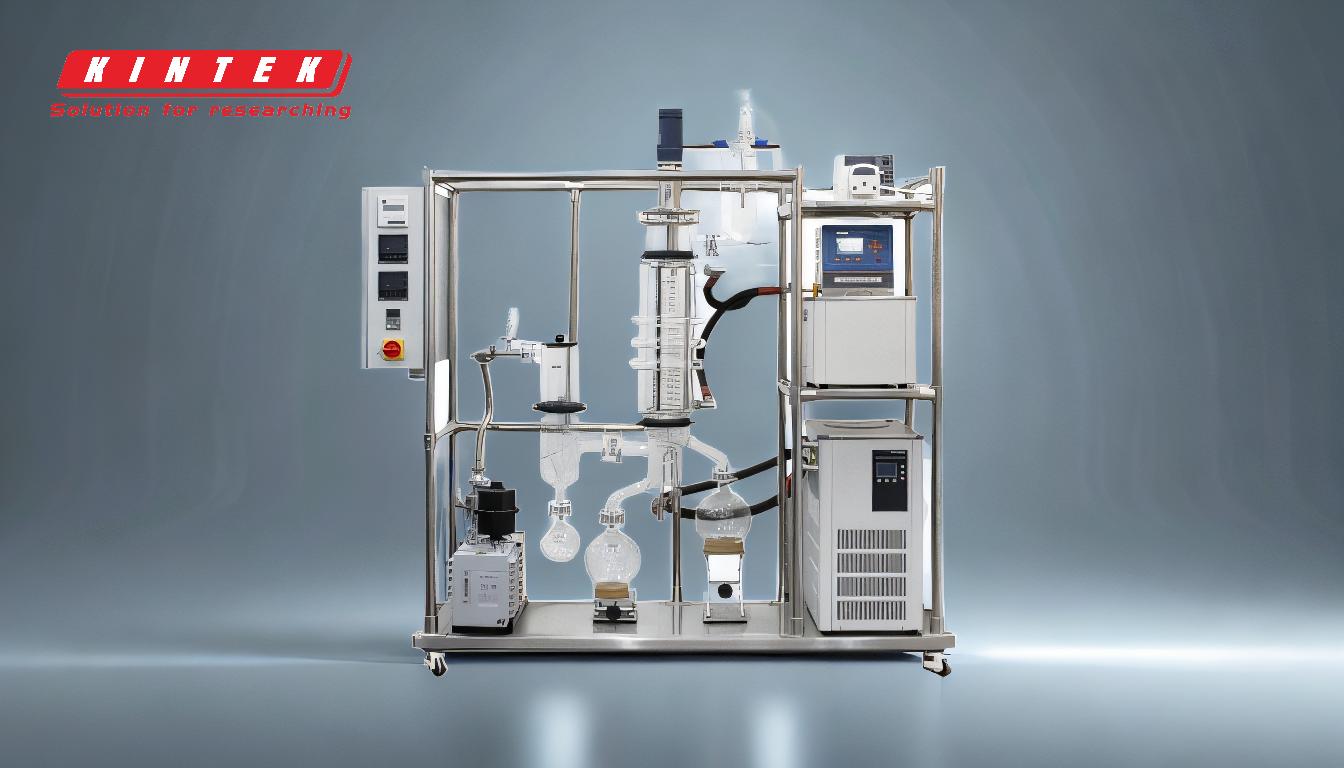Distillation is a critical process in the pharmaceutical industry, particularly for purifying heat-sensitive or high-boiling-point compounds. One notable example is the use of molecular distillation and short path distillation to purify pharmaceutical-grade compounds like antibiotics, steroids, and vitamins (e.g., vitamin E). These methods are preferred because they operate under reduced pressure and lower temperatures, minimizing the risk of degrading sensitive molecules. For instance, molecular distillation is used to extract and purify vitamin E, which is widely used in skincare and pharmaceutical formulations. Similarly, short path distillation is employed to produce amino acid esters and polymer intermediates, which are essential in drug manufacturing. These distillation techniques ensure high purity and stability of pharmaceutical products, meeting stringent regulatory requirements.
Key Points Explained:

-
Molecular Distillation in Pharmaceuticals:
- Molecular distillation is a specialized technique used to purify heat-sensitive and high-boiling-point compounds.
- It operates under vacuum conditions, reducing the boiling points of substances and preventing thermal degradation.
- Applications in the pharmaceutical industry include the purification of antibiotics, steroids, and vitamin E.
- For example, vitamin E is extracted and purified using molecular distillation for use in skincare and pharmaceutical products.
-
Short Path Distillation in Pharmaceuticals:
- Short path distillation is another vacuum-based distillation method, ideal for small-scale or high-purity applications.
- It is used to process compounds that are unstable at high temperatures or require precise separation.
- In the pharmaceutical industry, it is applied to produce amino acid esters, polymer intermediates, and vitamins.
- For instance, short path distillation is used to create vitamin E, which is a key ingredient in skincare and health supplements.
-
Purification of Heat-Sensitive Compounds:
- Many pharmaceutical compounds, such as antibiotics and vitamins, are sensitive to heat and can degrade at high temperatures.
- Vacuum distillation methods (molecular and short path) are preferred because they operate at lower temperatures, preserving the integrity of these compounds.
- This ensures that the final product meets the required purity and efficacy standards.
-
Applications in Drug Formulations:
- Distillation is used to remove impurities from drug formulations, ensuring the safety and effectiveness of pharmaceutical products.
- For example, molecular distillation is used to purify steroids, which are critical components in anti-inflammatory and hormonal treatments.
- Similarly, short path distillation is employed to produce intermediates for polymer-based drug delivery systems.
-
Regulatory and Quality Considerations:
- The pharmaceutical industry is highly regulated, requiring strict adherence to purity and quality standards.
- Distillation techniques like molecular and short path distillation are essential for meeting these requirements, as they provide high levels of purity and consistency.
- These methods are also scalable, making them suitable for both small-scale research and large-scale production.
-
Comparison with Other Distillation Methods:
- Unlike traditional distillation methods, molecular and short path distillation are specifically designed for heat-sensitive and high-boiling-point materials.
- Traditional distillation methods may not be suitable for pharmaceutical applications due to the risk of thermal degradation.
- Vacuum distillation methods are more efficient and precise, making them the preferred choice in the pharmaceutical industry.
By leveraging advanced distillation techniques like molecular and short path distillation, the pharmaceutical industry can produce high-purity, stable, and effective drugs and supplements, ensuring compliance with regulatory standards and delivering safe products to consumers.
Summary Table:
| Distillation Method | Key Features | Applications |
|---|---|---|
| Molecular Distillation | Operates under vacuum, reduces boiling points, prevents thermal degradation. | Purification of antibiotics, steroids, and vitamin E for skincare and drugs. |
| Short Path Distillation | Ideal for small-scale, high-purity applications; precise separation. | Production of amino acid esters, polymer intermediates, and vitamins. |
| Traditional Distillation | Not suitable for heat-sensitive compounds; risk of thermal degradation. | Limited use in pharmaceuticals due to high-temperature requirements. |
Learn how advanced distillation techniques can enhance your pharmaceutical processes—contact our experts today!









